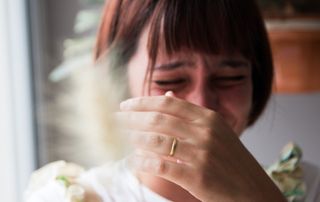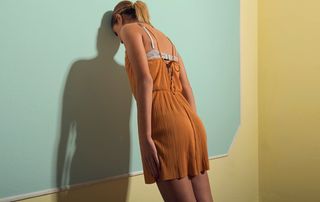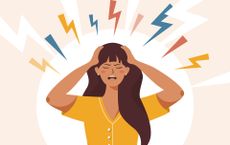Signs of depression – 11 symptoms to look out for
Depression affects nearly one in five adults in the UK, but when do feelings of sadness become a mental health issue?


We all have days when we're fed up. Perhaps we are tired or hungover or have a dose of the winter blues – all of which can lead to a low mood. But when a 'down' day becomes a 'down' week that turns into a 'down' month it's worth knowing what the signs of depression are.
"Depression is a common mental disorder and is quite different from just feeling sad or unhappy," says Richard Colwill, a spokesperson for the mental health charity SANE. "Common mental disorders cause significant emotional distress and interfere with a person’s ability to function."
Cases of depression are on the rise. According to the National Office of Statistics (ONS), levels are higher than before the pandemic. About 1 in 6 (17%) adults experienced some form of depression in summer 2021 as opposed to 1 in 10 before coronavirus took hold. While this upsurge is, to some extent, pandemic-related, there are certain age groups that seem more vulnerable. "In recent years, there's been an increase among men and women in later middle age, as well as among young women," says Richard. For example, between 21 July-15 August 2021, around 1 in 3 (32%) women aged 16-29 years suffered from moderate to severe depressive symptoms, according to the ONS.
While these are concerning statistics, as well as it being a particularly challenging time – which makes increased rates an inevitability – we are becoming better educated about our mental health. Therefore, more cases are reported. However, many of us are still unsure as to what actually constitutes the condition or feel afraid to admit to it. By reading up and understanding the signs of depression you can help yourself or others who are struggling.
What is depression?
The signs of depression can differ depending on who is feeling them, but the key symptoms are feelings of hopelessness and unhappiness that persist for more than a few weeks. "If you experience mild depression, you might find that you get less enjoyment from the things you previously enjoyed," says Rosie Weatherley, on behalf of mental health charity Mind. "You might feel like you want to withdraw from loved ones, have trouble eating, sleeping and exercising, or, conversely, do these things more than you normally would," she explains.
Many people manage depression by self-care. This means eating and sleeping well, exercising, taking time to relax, and talking to friends and family or having therapy. Moderate to severe depression can also benefit from these actions, but sufferers may also need more intense therapy or medication.
"If you’re experiencing severe depression, you might be thinking about or doing things to harm yourself. Or you may struggle with suicidal thoughts," says Rosie. "You might also experience hallucinations – seeing or hearing things that others can’t – or delusions when you experience an altered state of reality."
GoodtoKnow Newsletter
Parenting advice, hot topics, best buys and family finance tips delivered straight to your inbox.
There are a number of reasons why we might become depressed, and no one is immune. These can range from having a genetic predisposition – people with a family history of depression are more likely to experience it – to life-changing events, such as the death of a loved one. Even positive events such as having a baby can trigger postnatal depression in women, as well as male postnatal depression.
“The causes of depression vary from person to person, but we know that there is a link between worsening mental health and major life events, such as bereavement and redundancy," says Rosie. This applies even for those who have never struggled with their mental health before. "Problems with things like housing, finances and benefits are also linked to poor mental health."

11 signs of depression
Signs of depression can be multiple and – at times – surprising. What's more, if you have depression your symptoms can differ from someone else with the same condition. They can be both psychological and physical and vary between individuals, explains Michelle Morgan, an ambassador for Mental Health First Aid England and author of Own Your Awkward (Amazon | £10). Her book charts her experiences of depression that will resonate with many. "Yet what I experienced could be very different compared to someone else," she says.
Michelle struggled with low mood, feelings of hopelessness and tearfulness, guilt and irritability. She had little motivation and stopped enjoying activities that were normally enjoyable. She also found it difficult to make decisions and suffered from a lack of energy and disturbed sleep. "I can remember experiencing all of these at some point in my depression, but it took me far too long to talk about how I was feeling, and then even longer to ask for support," she says.
Our checklist, below, details some of the more common signs of depression. Have a read and if you suspect your lingering low mood is concerning take this NHS self-assessment test for depression. You can also watch this video, courtesy of Mind, where sufferers talk about their experiences.
https://youtu.be/m82jEQXRurg
1. Low mood that lasts longer than two weeks
If you feel low, desperate or hopeless for more than a fortnight, you may be depressed. These feelings can occur because of an event in your life – anything from a big life change to trauma or illness – or appear out of the blue for no apparent reason. For women, their menstrual cycle may play a part – there is a link between women who get PMT or suffer from PMDD (pre-menstrual dysphoric disorder) and depression.
How to ease it: If you notice changes to your thoughts, feelings and behaviours that are affecting your daily life, last longer than two weeks, or keep returning – talk to someone you trust, ideally your GP. Rosie Weatherley, on behalf of mental health charity Mind, told us, "A health professional can carry out an assessment to help decide whether your symptoms of depression are mild, moderate, or severe. This will be based on the type, severity, length, and frequency of the reported symptoms, and the extent to which they affect your day-to-day life."
2. Loss of pleasure
If you find that doing the things you once loved – such as hobbies or spending time with friends, children or pets – no longer make you happy, you could be experiencing a loss of pleasure. Known medically as anhedonia (the inability to feel pleasure), it's one of the telltale signs of depression. It's also found in people suffering from chronic illness or substance abuse.
"We can feel disconnected from interests we enjoy, like sex, sports or games when struggling with depression. This is because our hormones are unbalanced," says Grace McMahon, a life coach at BeingWell, which provides expertise on how to live well. "We don’t get those dopamine reward hits or serotonin boosts like we usually would. So we don’t find that joy we once did in finishing a painting or jigsaw, in exercising or pleasure."
How to ease it: Although anhedonia can cause social withdrawal, Grace's recommendation is to reach out sooner rather than later. "Let someone you trust know how you’re feeling," she says. "Perhaps they’ll help with errands or encourage you when you can’t encourage yourself."
3. Lethargy
Lethargy means a lack of energy and enthusiasm in daily life. Although it can just feel like tiredness at first, lethargy is more akin to that 'meh' feeling you get when you can't be bothered with anything, or you don't feel like waking up in the morning, socialising or exercising. Even people with mild depression may find it harder to care for themselves, their pets or their families.
These are the three core symptoms we associate with depression: low mood, a loss of pleasure in things you normally enjoy, and a lack of energy or motivation, says Richard. He adds: "Depression can rob you of your ability to engage in the world around you. Even simple tasks can feel next to impossible if you become very unwell."
How to ease it: Again, if this feeling doesn't go away, your best course of action is to speak to a professional. "If these symptoms are persistent, and last for more than two weeks, consult your GP," he advises.

4. Feeling numb
Also known as emotional blunting, feeling numb can be another of those signs of depression. You may have difficulty accessing your emotions and feel out of touch with your feelings. "Depression zaps our joy, it causes us to think and feel very negatively," says Grace McMahon, a life coach at BeingWell. "Many report feeling ‘numb’ when depressed. There are no feelings towards anything, which further zaps our motivation to change it," she explains.
It's not unusual to self-medicate when you're depressed as stimulants can offer relief or escape. But this is only temporary. "It can be tempting to turn to alcohol or other drugs to help cope with symptoms, but you should avoid these as it can make things worse," says Richard Colwill, a spokesperson for the mental health charity SANE. In fact, according to the Royal College of Psychiatrists 'self-harm and suicide are much more common in people with alcohol problems'.
How to ease it: While it may not work for everyone, taking time out to try and 'reignite' our joy and to do things that make us feel happy or safe can be very useful. "This can be tricky when we really don’t feel like anything is joyful," says Grace. "So start small and start familiar, then it doesn’t seem too daunting."
Grace suggests taking five minutes out of your day to do something nice. Build on this time until you've had an hour of joyful activity. This could be a walk in nature, having a massage, spending time with a pet or friend, going for a swim, doing crafts or writing in a journal.
5. Loss of appetite or overeating
When we are depressed our basic functions, such as eating and sleeping, are affected. Some people – especially those whose depression is accompanied by feelings of anxiety – may find their stomach is too churned up to eat and could lose weight. Others may 'eat their feelings' and self-soothe by overeating.
"Appetite can be a problem for some people with depression, who find it difficult to eat. Although, conversely, for others overeating can be a problem," says Richard.
How to ease it: To counteract this, Richard suggests sticking to a routine. "One strategy to tackle this would be to focus on eating at regular mealtimes – especially breakfast – and avoid snacking," he suggests.
Limit or stop drinking alcohol, caffeine and sugar as these are stimulants that may cause fluctuations in mood. And swap junk and refined foods for nourishing meals (the Mediterranean diet is a good option) that contain lean protein like chicken and fish, and wholegrains that provide a steady source of energy.
6. Trouble sleeping
Studies show that stress and anxiety impacts our sleep. And so can depression. In fact, the link is so strong that research undertaken by members of the Psychopharmacology Unit at the University of Bristol found that around three-quarters of depressed patients showed symptoms of insomnia, while hypersomnia (daytime sleepiness) was apparent in 40% of young depressed adults, especially women.
A lack of sleep is also one of the proven risk factors of suicide in people with major depressive disorder (MDD), so getting enough sleep or, at the very least, rest is integral.
"Problems with sleeping are common," says Richard Colwill, a spokesperson for the mental health charity SANE. "Many find it hard to sleep, while others sleep too much and struggle to get out of bed in the morning," he says.
How to ease it: While it may feel like the last thing a depressed person feels like doing, exercise - such as running - can help lift the mood by stimulating endorphins (feel-good hormones). "Regular exercise helps regulate sleep, though it needs to be tailored to what you feel capable of doing. Walking each day (especially if you have access to a park or countryside) is a helpful start," says Richard.
It's preferable to exercise outside for numerous reasons. Although more research is needed, there's a link between depressive symptoms and vitamin D deficiency. Getting plenty of sunshine is one of the best ways to get your fill of this vitamin. Being surrounded by nature also improves mood and wellbeing. Visit the Mind website to learn about ecotherapy and how it can help you.
Another option is a natural supplement to help you sleep. We love Healthspan's Night Time CBD Oil Drops (Healthspan | £17.20). As well as CBD it contains natural extracts of chamomile, hops, lavender and lemon balm to help you relax and fall asleep. However, if you are on any medication, check with your GP before taking this product.
7. Anger or irritability
Some of the less well-known signs of depression are anger and irritability. Depression is associated with lethargic, passive behaviour and feeling the need to hide from the world. But it's not unusual to feel angry when depressed. This anger is brought on by feelings of guilt, desperation or fear. Or it can have a biological basis – i.e. fluctuations in certain brain chemicals. Whatever the cause, it can be very disturbing to witness someone fly off the handle. And suppressed anger can lead to self-harming.
"Signs of depression include angry outbursts, irritability or frustration, even over the small things," says Grace McMahon, a life coach. "Our emotional regulation is not able to function as usual. We all have the logical brain and the emotional brain. When we’re depressed the emotional brain takes over and our thought processes lose logic. Spilt milk? Logical brain would get us to wipe it up and move on. Emotional brain gets frustrated. This can ruin most of the day," she explains.
How to ease it: Anger can be hard to manage and it may take time to find ways to calm down. Avoid drugs and alcohol, which can affect mood and make people more short-tempered, especially on a hangover or comedown. And be kind to yourself. "We often try to push negative feelings out the way to feel better, but they usually just come back stronger and longer," says Grace. "Allow yourself these feelings and be compassionate."
You could also try Cognitive Behavioural Therapy (CBT). This type of therapy challenges learned behaviours and provides tools to enable you to manage certain emotions. For example, in this case study a young man showed a significant decrease in anger as well as depression after undergoing CBT. The online CBT register is a resource that can help you find a CBT practitioner.

8. Brain fog
Brain fog can occur during a depressive episode, in pregnancy or the lead-up to menopause, or be a symptom of Long Covid or another chronic illness. It's a form of cognitive dysfunction that affects our memory, attention span, and our ability to think clearly and learn and retain information. Prioritising tasks and making decisions may also become more difficult. If you're not aware that brain fog is one of the signs of depression it can be a worrying symptom. Some people even believe they're developing dementia, hence its alternative name: pseudodementia.
"Depression clouds our executive functioning – that’s our thinking processes, like memory, learning, and attention," says life coach Grace McMahon. "Which is why it can interfere with our daily lives and make it difficult to maintain a routine."
How to ease it: While it's an alarming symptom, brain fog is manageable. "Get some rest, whether it’s physical rest by sleeping, or mental rest by watching a funny series, having a bath or going for a gentle walk," advises Grace. "Depression is emotionally draining, so we need to rest to recover and help our brains reset. Sometimes physical rest can be hard to come by when feeling depressed, so mental rest or relaxation can help here."
Certain supplements can help to lift brain fog. Omega-3 fish oil is excellent for brain health in general and has been linked to relieving depressive symptoms in people with major depressive order, especially those taking antidepressants. Try Aavalabs High Strength Omega-3 (Amazon | £17.99).
There is also promising research indicating that magnesium can ease depressive symptoms. Try Nutri Advanced Magnesium Glycinate (Nutriadvanced | £20.80).
9. Feeling of worthlessness and guilt
Depression is still a misunderstood condition. For those who have never experienced it, it can be hard to fathom how all-consuming it can be. If people show a lack of sympathy – usually out of ignorance rather than malice – depressed people can feel even more worthless and guilty for not enjoying life. Alternatively, sufferers often beat themselves up for feeling low when others seem to have worse lives. Or they may feel guilty because they struggle to enjoy their children or support their spouse or friends.
How to ease it: Cognitive Behavioural Therapy (CBT) or counselling can help you work through these negative feelings. It doesn't matter if your illness isn't 'physical' as such. Remember that you are unwell and deserve to get better as much as anyone else.
"There are no quick fixes for depression, but small changes and steps to feel a bit better each day will help us get back to our usual selves," says Grace. "Even then we’ll have good and bad days, so don’t be too hard on yourself."

10. Sexual dysfunction
A low libido (sex drive) - and wondering why you've gone off sex - can also be signs of depression that many will experience. According to research published in the Journal of Clinical Psychiatry around 40% of women with a sexual disorder such as a lack of desire, or an inability to become aroused or to reach orgasm experience concurrent depression.
How to ease it: As well as not feeling 'in the mood' many depressed people will withdraw from intimate contact. But if you can manage it, you may find that sex or masturbation is helpful. This is because these acts release the mood-boosting chemicals dopamine, endorphins and oxytocin that relieve stress, improve mood and aid sleep. If you can't face sex and you have a loving partner, cuddling or holding hands can release oxytocin. This 'love hormone' can ease anxiety and help you feel closer to another person.
Somewhat ironically, antidepressants and certain other medications can also affect libido or cause sexual dysfunction. If you think this may be the case, talk to your doctor.
11. Suicidal ideation or attempts
In extreme cases, someone with depression may fantasise about ending it all, or may attempt to commit suicide. It's immaterial if this is a cry for help. If someone is considering suicide they will need immediate help and support. "When depression consumes us, we can feel there is no other way out," says Grace McMahon. "Or that we don’t want to be here with those thoughts anymore. We feel worthless about ourselves which can lead to guilt, suicidal thoughts or attempts."
How to ease it: If you, or someone you know, is at this stage it's essential they get help. "It’s so important to seek professional help for depression to prevent getting to this point and help us come back from it if we’re already there," says Grace. "Speak to your GP about options. It can be scary, but they’ve heard it before and can offer different treatment approaches to help you."
Contact your GP to request an urgent appointment. Closed surgeries usually provide details of an out-of-hours doctor. Alternatively, call a friend or loved one, go to A&E, or call a helpline such as the Samaritans on 116 123 or the National Suicide Prevention Helpline on 0800 689 5652.
When to seek medical advice
If you are persistently depressed, low or tearful these are signs of depression, so talk to someone. While friends and family can be brilliantly supportive, a professional can provide more practical help rather than a shoulder to cry on. GPs are well-versed in treating depressed patients. They will offer advice and recommend lifestyle changes, therapy or medication depending on the severity of your symptoms. However, if you don't feel you are getting the help you need from your GP you are perfectly entitled to change doctors.
Unfortunately, waiting lists for therapy or counselling through the NHS can be long. If this turns out to be the case for you, find a private therapist. Many offer a sliding scale of payment, depending on what you can afford. You can meet someone in person, or have virtual sessions (this has become an increasingly popular option since lockdown). Take a look at the Counselling Directory to find a counsellor or therapist nearby. Again, if you don't 'gel' with your therapist don't feel you have to stick with them.
Treating depression sooner rather than later can make life easier. "This is especially important as evidence suggests that the earlier you begin treatment, the better the outcome is likely to be, as depression can become entrenched over time," says Richard Colwill, a spokesperson for the mental health charity SANE.
You may find that people will say something did or didn't work for them. While it's helpful to hear other people's experiences, try not to compare your experience to theirs. "There’s no one ‘cure’ or treatment for poor mental health. You must have some patience and perseverance to find what works for you – we are all different," says Michelle. "Stick with it though, as there really are so many different and effective ways to support your mental health."
Michelle designed her own personal support. Called The M-Plan (Move, Meditate, Make, Meet, Meaning and Mindset) it gives prompts to check in with what she needs daily to support her mental health. "It’s flexible and I use it to give myself space and permission to consider what would feel beneficial to me," she explains. "I also take medication and have therapy when I need some extra support. I’m not ashamed of any of the supports I use to look after my mental health; in fact, I have more moments of joy in my life than ever before," she says.
"Everyone with a mental health problem deserves to be able to access the help that they need," says Rosie Weatherley, on behalf of mental health charity Mind. "No matter what kind of depression you have, treatments are available."
For more advice read SANE's factsheet on depression or visit the MIND website.

Debra Waters is an experienced online editor and parenting writer. She also has a strong background on health, wellbeing, beauty, and food. She currently writes for Goodto and Woman&Home, and print publications Woman, Woman’s Own, and Woman’s Weekly. Debra has written for What to Expect, Everyday Health, and Time Out. In addition, she has had articles published in The Telegraph and The Big Issue.
-
 I tested the Lakeland Dual Basket air fryer and it made midweek family cooking a breeze
I tested the Lakeland Dual Basket air fryer and it made midweek family cooking a breezeYou can’t go wrong with the dual basket air fryer by Lakeland complete with easy-view windows to ensure burnt food is a thing of the past…
By Jessica Dady Published
-
 Reframing one simple habit could get your sex life back on track after having a baby, new research shows
Reframing one simple habit could get your sex life back on track after having a baby, new research showsMany parents struggle to get their sex life back on track after having a baby, but new research has shown how one simple habit could make all the difference.
By Ellie Hutchings Published
-
 Half of Gen Z say their parents 'don't take my mental health concerns seriously', research shows - here are 3 ways to help support older children
Half of Gen Z say their parents 'don't take my mental health concerns seriously', research shows - here are 3 ways to help support older childrenWith research showing that half of teens and young adults feel their parents don't take their mental health concerns seriously, we share how you can show your support.
By Ellie Hutchings Published
-
 12 signs of depression in children and what to do if you're worried, explained by experts
12 signs of depression in children and what to do if you're worried, explained by expertsKnowing the signs of depression in children is an important step towards being able to get professional help early, to avoid it having a long-term impact on a child's life.
By Ellie Hutchings Published
-
 How to manage stress: 12 tips from experts
How to manage stress: 12 tips from expertsIf you want to know how to manage stress, rest assured there are some simple and effective ways
By Debra Waters Last updated
-
 Panic attack symptoms, triggers and how to calm down
Panic attack symptoms, triggers and how to calm downPanic attack symptoms can affect us physically, mentally and emotionally - here's how to ease them, according to medical experts and therapists
By Debra Waters Published
-
 11 signs of stress - and expert tips on how to deal with them
11 signs of stress - and expert tips on how to deal with themWhat stress is, how to cope with the symptoms, and where to turn for help.
By Debra Waters Published
-
 Breathing exercises for anxiety for adults and kids to try at home
Breathing exercises for anxiety for adults and kids to try at homeBy Rose Goodman Published
-
 How to practice 'gratitude meditation' - and four other tips to combat stress and burnout
How to practice 'gratitude meditation' - and four other tips to combat stress and burnoutStress is a modern epidemic – 40 per cent of us Brits experience stress and burn-out EVERY day. Could gratitude meditaion help? We explain how, along with other tips for combatting burnout.
By Sharon Sweeney Published
-
 Top 5 podcasts for better mental health
Top 5 podcasts for better mental healthWill you be tuning in?
By Miriam Habtesellasie Published